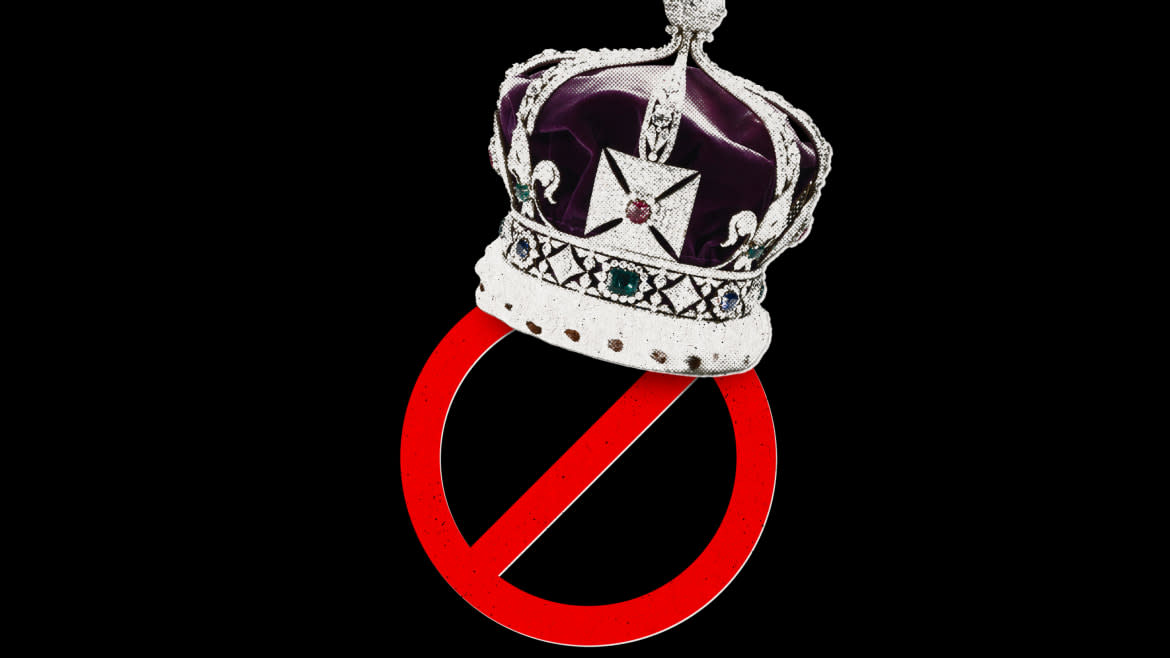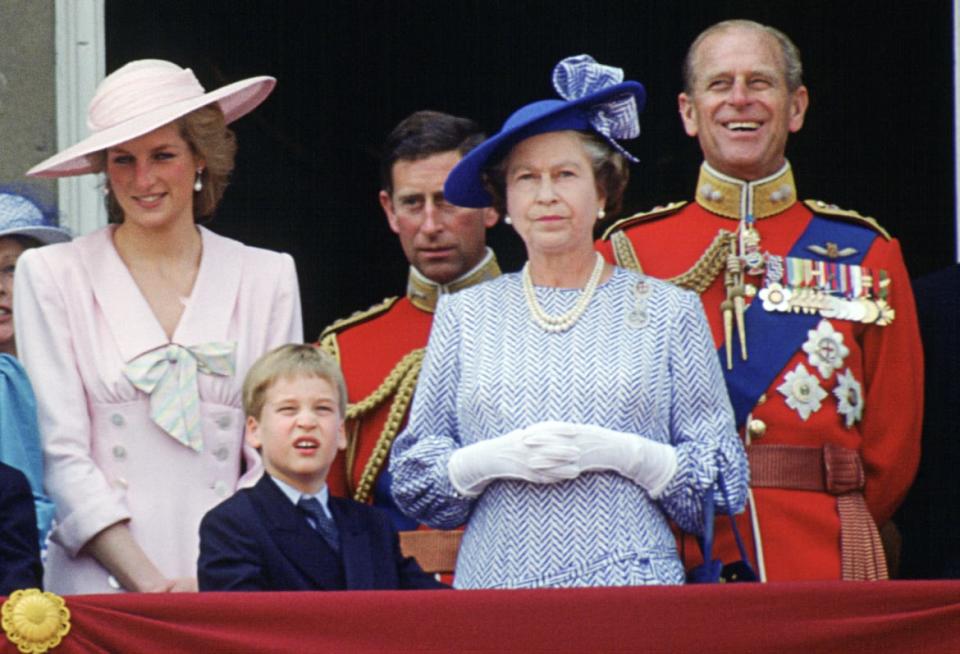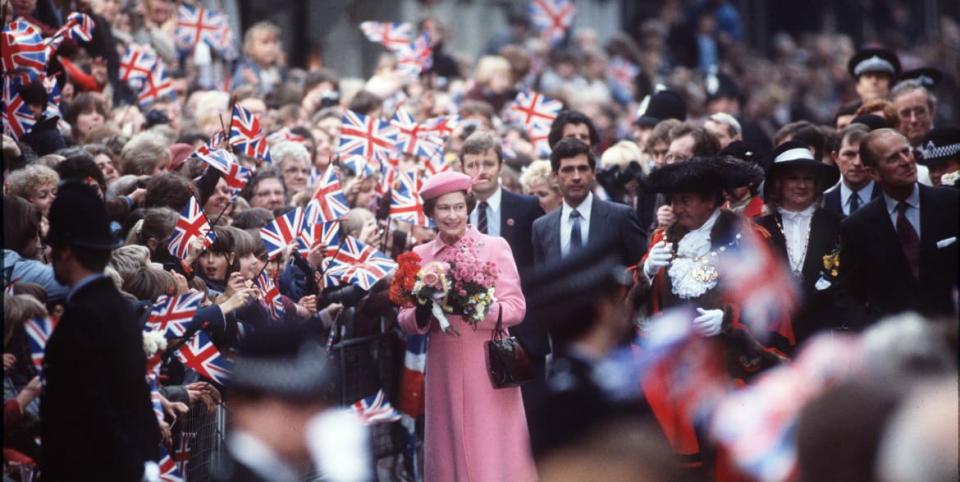The British Monarchy Should Die With the Queen

- Oops!Something went wrong.Please try again later.
- Oops!Something went wrong.Please try again later.
- Oops!Something went wrong.Please try again later.
Americans who are tempted to use the death of Queen Elizabeth II for an excuse to indulge in a vicarious modern monarchism—all Oprah/Meghan Markle style, no real substance—would do well to remember the harsh facts: The House of Windsor is as important in terms of the British constitution as the Targaryens are to the Iron Throne.
Their motto says it all, in the Norman French of the dynasty before the dynasty before the dynasty before the Windsors’ own: Honi soit qui mal y pense—or, in the contemporary vernacular: Don’t f**k with us—or we’ll f**ck with you.
It’s true that the late queen played her hand beautifully: Since the Glorious Revolution of 1688—which, lest you forget, followed an English revolution, a vicious civil war (one in 10 Britons died) and an unsuccessful attempt to restore an absolutist monarchy—British sovereigns have been left with largely negative capabilities.
Queen Elizabeth Remained a Mystery Her Entire Life, Just as She Intended
Required to acknowledge the legitimacy of governments elected by increasingly wide franchises, they’ve also been obliged to sign into law whatever statutes are placed before them. Walter Bagehot, the pre-eminent constitutional theorist of the late 19th century, put it thus, the monarch possesses “the right to be consulted, the right to encourage, the right to warn.” What she or he doesn’t have is any say whatsoever in what constitutes the law of the land—let alone the ability to impose it.
So, following the disastrous interwar period—with its major social unrest, and abdication of a monarch who favored brute concupiscence over constitutional niceties—the House of Windsor was in a difficult situation. The queen’s father, George VI (in the bloodline-obsessed vernacular of the English aristocracy, the “spare” rather than the heir), had a good if muted war, leaving the stage vacant for his young daughter to accede to a throne faced with all that the second half of the 20th century had to offer, in terms of precipitate political events.
Indeed, it was the third of the late queen’s prime ministers, Harold Macmillan, who, on asking his then-home secretary, Rab Butler, what constituted the greatest threat to a statesman’s career, received the trenchant reply: “Events, dear boy. Events.”
It was the queen’s political genius to elevate herself above the events that have lain waste to sublunary politicos—whatever government was in power, true blue, or potentially blood-red, she has been preternaturally careful not to express a scintilla of partisan feeling.
Peter Hennessy, the now-ennobled constitutional theorist, propounds the “‘good chaps” theory of British governance, which is: In the absence of any written constitution, what stops the de facto British electoral dictatorship from running populist and amok are the “good chaps” who hold the highest offices of state.
Thus, if the British prime minister is primus inter pares (first among equals), their monarch is the Supreme Good Chap. The queen had an hour every week with 15 holders of the highest office in the land, beginning with Winston Churchill.
On Monday of this week, hours away from her own demise, she received the resignation of one premier, and appointed the next. If, in some strange valetudinarian gesture, she told Boris Johnson what a disappointment he’d been—and adjured Liz Truss, his successor, not to similarly screw things up—we will never know. Johnson conspicuously failed to be a good chap (including on one occasion tattling on the sovereign, which is lèse-majesté in its purest form), and that was his downfall; but whether the British political class can continue to be good chaps (and chapesses) now that the queen is dead, remains troublingly moot.
Younger people, confused by the queen’s mystique, would do well not just to consider the constitutional niceties, but the erotics of her power. When I was a boy in the 1960s, there was a well-publicized survey that showed the vast majority of British men had had sexual dreams about the monarch. She was a looker—no doubt, and carried this “halo effect” into everything else she did.

Queen Elizabeth II, Prince Philip, Prince Charles, Diana Princess of Wales, and Prince William stand on the balcony of Buckingham Palace.
When Diana Spencer rocked the institution by speaking openly of the then-Prince of Wales’ infidelity, it was the queen who received the public’s sympathy.
No one questioned the parenting of a sovereign who’d managed to raise a kid who thought it was fine to marry a publicly accredited 20-year-old “virgin” while maintaining a long-running affair with a married woman—just as no one has questioned the parenting of a sovereign whose second son, Andrew, has been accused of having non-consensual sex with a young woman offered up to him by the notorious serial sexual abusers Jeffrey Epstein and Ghislaine Maxwell. Even Harry and Meghan’s Oprah antics and jerkoff podcasts have failed to besmirch the queen herself.
That just goes to show you quite how good a chap the British public believed Elizabeth to be.
Queen Elizabeth’s Death Heralds End of a Remarkable, History-Making Reign
As to whether this aura of unimpeachable decency will carry over to her eldest son, King Charles III, the jury may well be out—but soundings suggest the British body-politic is in a notably quiescent mood.
The Andrew/Epstein snafu has—in my view—holed the institution below the waterline: If the queen’s principal political strategy was to stand apart from (rather than surf) the zeitgeist, her greatest social skill was to convince Britons that the Windsors were a sort of bizarre analog of the typical lower-upper-middle-class British family. The love of dogs and horses, the breakfast cereals served in Tupperware containers, the resolute philistinism (the queen’s mother failed to recognize T.S. Eliot when he was actually in the room with her, reading The Waste Land aloud), and—despite the rumors about Phil the Greek—the histrionic monogamy; these were weapons she adroitly employed throughout her 70-year reign.
But her 73-year-old successor is neither so easy on the eye—nor so immaculate. Notoriously caught by phone hacker telling his then-mistress, Camilla Parker-Bowles, he wished he could be her tampon, the new king suffers from a sort of positive capability: There’s not just this whimsical sexual passion (which, personally, I find rather endearing), he has also spoken out rather too loudly and rather too often on all manner of contentious subjects—from the looming environmental crisis, to the clash between Christianity and Islam. (A particularly salient and sensitive matter, considering that the monarch heads up the Anglican church in England, while we also have a significant Muslim minority.)
Prince Charles (as was) moved decisively to exile his brother, the Duke of York, once the full compass of the accusations against him became clear. He has also spoken of his desire to see the British monarchy slimmed down—with the supernumerary princes and princesses no longer on the public payroll.
This is shrewd—but is it shrewd enough? He mounts the throne at a time of maximal political and social fissiparousness in Britain, and while he may say some of the right things, his personal lifestyle (which includes having his toothpaste squeezed on to his brush by one of his numerous valets), speaks of a man who embodies Oscar Wilde’s dictum that England is “the native land of the hypocrite.”
Prince Harry Was in the Air, Not at Balmoral, When the Queen’s Death Was Announced
As I said at the outset: Americans keen to get their Ruritanian kicks goggling at all the performative pomp and circumstance that will unfold over the next week or three, as one monarch is buried and another hailed, would do well to consider this: We live here, and this is a vital part of our governance.
While any number of polls may suggest that the British monarchy enjoys high regard among its subjects, the constitutional settlement they enshrine has never been more under threat—from the aftershocks of Brexit and resurgent Irish nationalism, and from the Scots’ desire for schism, as well. And of course, as the post-imperial dynasty par excellence, the queen set great personal store on her stewardship of the Commonwealth—that revenant of empire that allowed her to yet pretend to world-girdling dominion.
The Windsors must now face up to a burgeoning Black and South Asian British community who, for the most part, have little time for their “inclusive” posturing.

The Queen And Prince Philip On Walkabout.
King Charles III’s mother had nominative determinism on her side: In England, the mythos of the first Queen Elizabeth remains a potent element of our chronic conception of ourselves as a merry realm where, notwithstanding hereditary monarchs and land-owning aristos, our social relations remain organic and egalitarian. Charles, by contrast, follows two namesakes widely viewed as representing the zenith of monarchical perfidy.
The Banqueting Hall—from the window of which Charles I stepped on to the scaffold—still stands in Whitehall. Charles II managed to die in harness—but his successor James II of England was driven into exile. It’s perhaps these tragic forebears whom the new king should consider, rather than his clever, charismatic, and irreplaceable mother.
Get the Daily Beast's biggest scoops and scandals delivered right to your inbox. Sign up now.
Stay informed and gain unlimited access to the Daily Beast's unmatched reporting. Subscribe now.

